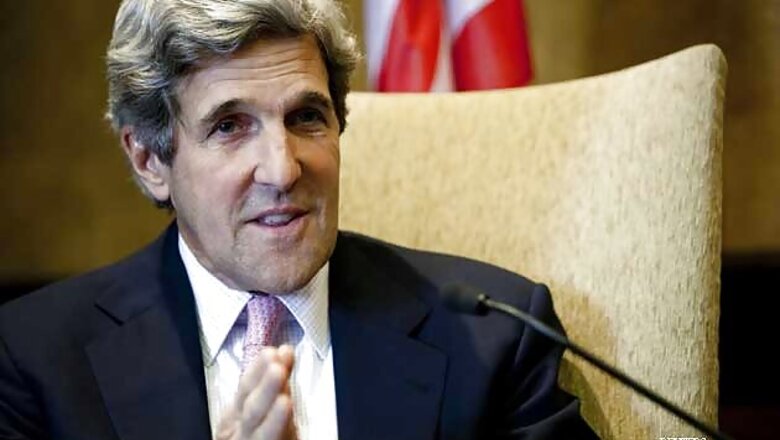
views
Islamabad: US Secretary of State John Kerry landed in Pakistan late on Wednesday for a day of talks aimed at easing tensions over US drone strikes while putting pressure on the nuclear armed nation to do more to eliminate militant havens on its territory. In Pakistan on an unannounced visit, Kerry is also likely to discuss ways to revive deadlocked talks with the Taliban and broader efforts to stabilise neighbouring Afghanistan as US-led forces prepare to pull out most combat troops by late 2014.
"We will discuss with the Pakistanis counter-terrorism, cross-border militancy, the economic agenda and how we can continue to partner in terms of promoting a secure and stable Afghanistan," a senior US official told reporters travelling with Kerry.
Kerry is keen to put a fresh focus on a relationship severely strained by US drone strikes which Pakistan says breach its sovereignty, and the raid by US special forces which killed Osama bin Laden in a Pakistani town in 2011. Pakistan itself has seen a spate of attacks by the al Qaeda-linked Taliban across the South Asian country since the new prime minister, Nawaz Sharif, was sworn in more than a month ago, raising concerns about regional stability.
The United States, Pakistan's biggest donor, wants Pakistan to come up with a clear plan and to step up its campaign against groups such as the Haqqani network, which regularly attacks US forces in Afghanistan from its mountain hideouts in Pakistan. "Safe havens for extremist groups clearly threaten our interests, our allies in the region and most of all Nawaz Sharif's own ability to execute his reform agenda and provide greater economic stability," the senior official said.
It is Kerry's first visit to Pakistan as Secretary of State although he has visited the country in other capacities before. Both sides appear keen to start a new chapter in their relationship. President Barack Obama hailed Sharif's victory in May as a "significant milestone" for Pakistan's democracy.
Speaking on condition of anonymity, the official praised Sharif for taking "pretty remarkable" steps to address domestic economic problems such as crippling power shortages.
"Unlike previous visits, we are not going at a moment of crisis, which has defined the relationship over the last several years, but at a moment of quite unique and aligned interests," said the US official.
"It is an alignment of several factors that made this the right time to go to begin a series of substantive, meaty and important discussions with the new civilian government and a range of other stakeholders in Pakistan," the official added.
Security will be the toughest item on the agenda. The Haqqani network is allied to the Afghan Taliban and has bases in the rugged borderland between Afghanistan and Pakistan where other militant al Qaeda-linked groups are also based.
Another US administration official said the Haqqani network remained "resilient" despite U.S. sanctions and efforts to choke off its funding. While the issue of extremist groups operating in Pakistan was a priority for the talks, the official emphasised that the intention was not to tell the Pakistanis what to do.
"They are working on their own counter-terrorism strategy. We just need to wait and see what they come up with internally and how we can coordinate both in our bilateral relationship and with joint cooperation," the official said.
"Fostering or helping in any way to provide some sort of base for extremism is ultimately not in any our interests including Pakistan's interests. "We will have to see where the new government is on this and what they are willing to do, and how they see it as part of their broader efforts at promoting stability."
State Department spokeswoman Jen Psaki said Kerry would also visit Britain on his way back to the United States at the end of the week.



















Comments
0 comment